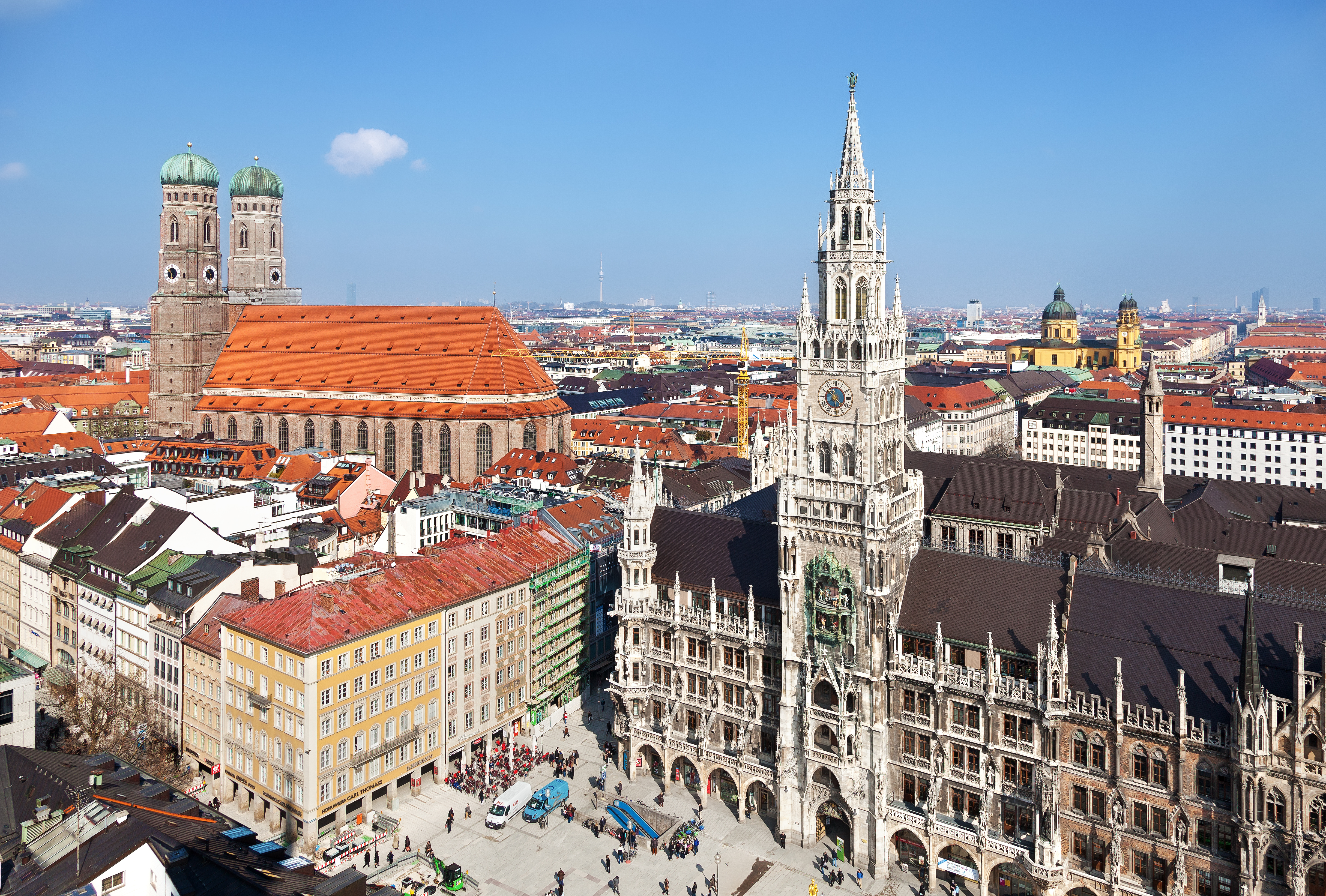
Munich
Munich (/ˈmjuːnɪk, -nɪx/ MEW-nik(h); German: München [ˈmʏnçn̩] ⓘ; Bavarian: Minga [ˈmɪŋ(ː)ɐ] ⓘ) is the capital and most populous city of the Free State of Bavaria. With a population of 1,589,706 inhabitants as of 29 February 2024,[3] it is the third-largest city in Germany, after Berlin and Hamburg, and thus the largest which does not constitute its own state, as well as the 11th-largest city in the European Union. The city's metropolitan region is home to about 6.2 million people and the third biggest metropolitan region by GDP in the European Union.[4]
This article is about the city in Germany. For other uses, see Munich (disambiguation).
Munich
1158
- Altstadt-Lehel
- Ludwigsvorstadt-Isarvorstadt
- Maxvorstadt
- Schwabing-West
- Au-Haidhausen
- Sendling
- Sendling-Westpark
- Schwanthalerhöhe
- Neuhausen-Nymphenburg
- Moosach
- Milbertshofen-Am Hart
- Schwabing-Freimann
- Bogenhausen
- Berg am Laim
- Trudering-Riem
- Ramersdorf-Perlach
- Obergiesing
- Untergiesing-Harlaching
- Thalkirchen-Obersendling-Forstenried-Fürstenried-Solln
- Hadern
- Pasing-Obermenzing
- Aubing-Lochhausen-Langwied
- Allach-Untermenzing
- Feldmoching-Hasenbergl
- Laim
310.71 km2 (119.97 sq mi)
520 m (1,710 ft)
1,512,491
4,900/km2 (13,000/sq mi)
2,606,021
5,991,144[1]
089
M, MUC
Straddling the banks of the river Isar north of the Alps, Munich is the seat of the Bavarian administrative region of Upper Bavaria, while being the most densely populated municipality in Germany with 4,500 people per km2. Munich is the second-largest city in the Bavarian dialect area, after the Austrian capital of Vienna.
The city was first mentioned in 1158. Catholic Munich strongly resisted the Reformation and was a political point of divergence during the resulting Thirty Years' War, but remained physically untouched despite an occupation by the Protestant Swedes.[5] Once Bavaria was established as the Kingdom of Bavaria in 1806, Munich became a major European centre of arts, architecture, culture and science. In 1918, during the German Revolution of 1918–19, the ruling House of Wittelsbach, which had governed Bavaria since 1180, was forced to abdicate in Munich and a short-lived Bavarian Soviet Republic was declared. In the 1920s, Munich became home to several political factions, among them the Nazi Party. After the Nazis' rise to power, Munich was declared their "Capital of the Movement". The city was heavily bombed during World War II, but has restored most of its old town and boasts nearly 30.000 buildings from before the war all over the city.[6] After the end of postwar American occupation in 1949, there was a great increase in population and economic power during the years of Wirtschaftswunder. The city hosted the 1972 Summer Olympics.
Today, Munich is a global centre of science, technology, finance, innovation, business, and tourism. Munich enjoys a very high standard and quality of living, reaching first in Germany and third worldwide according to the 2018 Mercer survey,[7] and being rated the world's most liveable city by the Monocle's Quality of Life Survey 2018.[8] Munich is consistently ranked as one of the most expensive cities in Germany in terms of real estate prices and rental costs.[9][10]
In 2021, 28.8 percent of Munich's residents were foreigners, and another 17.7 percent were German citizens with a migration background from a foreign country.[11] Munich's economy is based on high tech, automobiles, and the service sector, as well as IT, biotechnology, engineering, and electronics. It has one of the strongest economies of any German city and the lowest unemployment rate of all cities in Germany with more than one million inhabitants. The city houses many multinational companies, such as BMW, Siemens, Allianz SE and Munich Re. In addition, Munich is home to two research universities, and a multitude of scientific institutions.[12] Munich's numerous architectural and cultural attractions, sports events, exhibitions and its annual Oktoberfest, the world's largest Volksfest, attract considerable tourism.[13]
Quality of life[edit]
Most Munich residents enjoy a high quality of life. Mercer HR Consulting consistently rates the city among the top 10 cities with the highest quality of life worldwide – a 2011 survey ranked Munich as 4th.[201] In 2007 the same company also ranked Munich as the 39th most expensive in the world and most expensive major city in Germany.[202] Munich enjoys a thriving economy, driven by the information technology, biotechnology, and publishing sectors. Environmental pollution is low, although as of 2006 the city council is concerned about levels of particulate matter (PM), especially along the city's major thoroughfares. Since the enactment of EU legislation concerning the concentration of particulate in the air, environmental groups such as Greenpeace have staged large protest rallies to urge the city council and the state government to take a harder stance on pollution.[203] Due to the high standard of living in and the thriving economy of the city and the region, there was an influx of people and Munich's population surpassed 1.5 million by June 2015, an increase of more than 20% in 10 years.
Around Munich[edit]
Nearby towns[edit]
The Munich agglomeration sprawls across the plain of the Alpine foothills comprising about 2.6 million inhabitants. Several smaller traditional Bavarian towns and cities like Dachau, Freising, Erding, Starnberg, Landshut and Moosburg are today part of the Greater Munich Region, formed by Munich and the surrounding districts, making up the Munich Metropolitan Region, which has a population of about 6 million people.[4]
Recreation[edit]
South of Munich, there are numerous nearby freshwater lakes such as Lake Starnberg, Ammersee, Chiemsee, Walchensee, Kochelsee, Tegernsee, Schliersee, Simssee, Staffelsee, Wörthsee, Kirchsee and the Osterseen (Easter Lakes), which are popular among Munich residents for recreation, swimming and watersports and can be quickly reached by car and a few also by Munich's S-Bahn.[214]